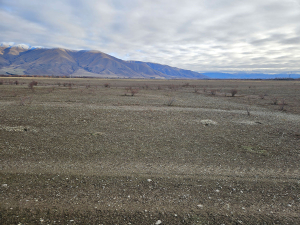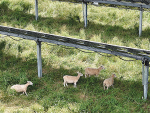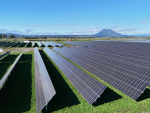Solar generation company, Lodestone Energy is partnering with Haldon Station, located in the heart of the Mackenzie District, to build and operate a 220 MW utility-scale solar farm.
The partners have carefully selected a 340ha land parcel for the solar farm – only 1.5% of the total station. Haldon Station has been owned by the Klisser family for more than three decades and is one of New Zealand's premier high-country stations, spanning more than 22,000ha.
Haldon Station had been considering for years how to enhance this area on the property that is non-productive, has suffered from significant wind erosion due to its dryness and pest infiltration. Lodestone saw value because of its top-quality solar resource, proximity to transmission infrastructure, and good road access and minimal visual impact. The partners also believe there is an opportunity for meaningful ecological restoration during the 70-year period that the solar farm could be operating.
“We believe from research, and observation on other well-planned developments on the property, that the partial shade and shelter from the panels, will result in a beneficial effect on the lands below and will result in revegetation of the original native fauna and flora,” says Paddy Boyd, Haldon Station farm manager of 42 years.
“The Station is planning for the area to be ring fenced with rabbit netting and totally destocked to allow for full regeneration of the natural grasses,”.
Haldon Station have spent several years investigating ways to reduce net emissions on the station along with options to utilise this non-productive area and identified Lodestone as the ideal partner out of a large field, because of a complete alignment in their long-term visions for protection of the land and environment.
Gary Holden, Managing Director of Lodestone Energy, says: “There’s increasing demand from commercial customers to have 100% renewable energy which is helping the country move towards a zero-carbon future. By diversifying our production and expanding into the South Island, we’re helping meet our customers’ needs, giving them an alternative power option and playing a key role in meeting zero carbon goals. In addition, we can support Haldon Station achieve their goals through restoration support.”
Construction of the solar farm is planned to start in 2025 and will produce 340 GWh per annum at full capacity, generating enough renewable energy to power nearly 50,000 homes.
Haldon Station is the fourth solar farm to be confirmed in Lodestone’s Phase 2 programme, with sites in Clandeboye, Mount Somers, and Dunsandel confirmed in January 2024. Lodestone’s Phase 2 solar programme will be funded by a recently announced capital raise led by Forsyth Barr and Barrenjoey.
Lodestone already has two North Island solar farms generating electricity, Kohirā and Rangitaiki and three additional North Island projects currently under planning or construction.











